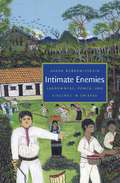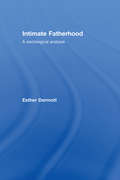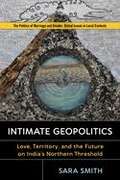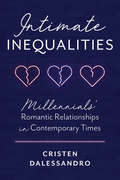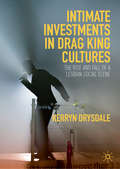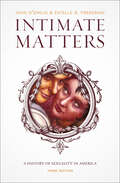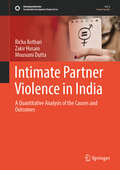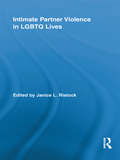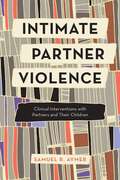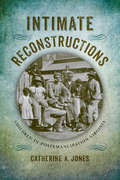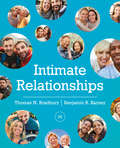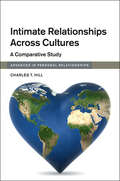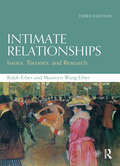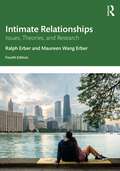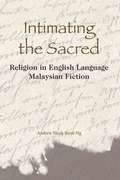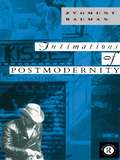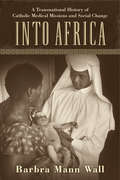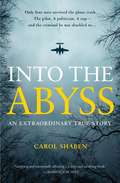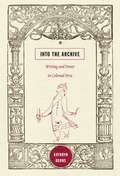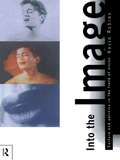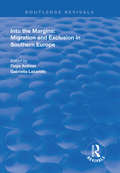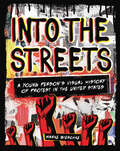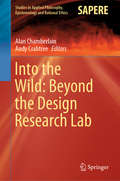- Table View
- List View
Intimate Enemies: Landowners, Power, and Violence in Chiapas
by Aaron Bobrow-StrainIntimate Enemies is the first book to explore conflicts in Chiapas from the perspective of the landed elites, crucial but almost entirely unexamined actors in the state's violent history. Scholarly discussion of agrarian politics has typically cast landed elites as "bad guys" with predetermined interests and obvious motives. Aaron Bobrow-Strain takes the landowners of Chiapas seriously, asking why coffee planters and cattle ranchers with a long and storied history of violent responses to agrarian conflict reacted to land invasions triggered by the Zapatista Rebellion of 1994 with quiescence and resignation rather than thugs and guns. In the process, he offers a unique ethnographic and historical glimpse into conflicts that have been understood almost exclusively through studies of indigenous people and movements. Weaving together ethnography, archival research, and cultural history, Bobrow-Strain argues that prior to the upheavals of 1994 landowners were already squeezed between increasingly organized indigenous activism and declining political and economic support from the Mexican state. He demonstrates that indigenous mobilizations that began in 1994 challenged not just the economy of estate agriculture but also landowners' understandings of progress, masculinity, ethnicity, and indigenous docility. By scrutinizing the elites' responses to land invasions in relation to the cultural politics of race, class, and gender, Bobrow-Strain provides timely insights into policy debates surrounding the recent global resurgence of peasant land reform movements. At the same time, he rethinks key theoretical frameworks that have long guided the study of agrarian politics by engaging political economy and critical human geography's insights into the production of space. Describing how a carefully defended world of racial privilege, political dominance, and landed monopoly came unglued, Intimate Enemies is a remarkable account of how power works in the countryside.
Intimate Fatherhood: A Sociological Analysis
by Esther DermottFatherhood is gaining ever more public and political attention, stimulated by the increasing prominence of fathers’ rights groups and the introduction of social policies, such as paternity leave. Intimate Fatherhood explores discourses of contemporary fatherhood, men’s parenting behaviour and debates about fathers’ rights and responsibilities. The book addresses the extent to which fatherhood has changed by examining key dichotomies - culture versus conduct, involved versus uninvolved and public versus private. The book also looks at longstanding conundrums such as the apparent discrepancy between fathers’ acceptance of long hours spent in paid work combined with a preference for involved fathering. Dermott maintains that our current view of good fatherhood is related to new ideas of intimacy. She argues that in order to understand contemporary fatherhood, we must recognise the centrality of the emotional father-child relationship, that the importance of breadwinning has been overstated and that flexible involvement is viewed as more important than the amount of time spent in childcare. Drawing on original qualitative interviews and large-scale quantitative research, Intimate Fatherhood presents a sociological analysis of contemporary fatherhood in Britain by exploring our ideas of good fatherhood in relation to time use, finance, emotion, motherhood and policy debates. This book will interest students, academics and researchers in sociology, gender studies and social policy.
Intimate Geopolitics: Love, Territory, and the Future on India’s Northern Threshold (Politics of Marriage and Gender: Global Issues in Local Contexts)
by Sara SmithWinner of the 2021 Julian Minghi Distinguished Book Award from the American Association of Geographers 2021 Foreword Indies Finalist - Politics and Social Sciences Intimate Geopolitics begins with a love story set in the Himalayan region of Ladakh, in India’s Jammu and Kashmir State, but this is also a story about territory, and the ways that love, marriage, and young people are caught up in contemporary global processes. In Ladakh, children grow up to adopt a religious identity in part to be counted in the census, and to vote in elections. Religion, population, and voting blocs are implicitly tied to territorial sovereignty and marriage across religious boundaries becomes a geopolitical problem in an area that seeks to define insiders and outsiders in relation to borders and national identity. This book populates territory, a conventionally abstract rendering of space, with the stories of those who live through territorial struggle at marriage and birth ceremonies, in the kitchen and in the bazaar, in heartbreak and in joy. Intimate Geopolitics argues for the incorporation of the role of time–temporality–into our understanding of territory.
Intimate Inequalities: Millennials' Romantic Relationships in Contemporary Times
by Cristen DalessandroWhen it comes to the topic of romantic and sexual intimacy, social observers are often quick to throw criticisms at millennials. However, we know little about millennials’ own hopes, fears, struggles, and triumphs in their relationships from the perspectives of millennials themselves. Intimate Inequalities uses millennials’ own stories to explore how they navigate gender, race, social class, sexuality, and age identities and expectations in their relationships. Situating millennials’ lives within contemporary social and cultural conditions in the United States, Intimate Inequalities takes an intersectional approach to examining how millennials challenge—or rather, uphold—social inequalities in their lives as they come into their own as full adults. Intimate Inequalities provides an in-depth look into the intimate lives of one group of millennials living in the United States, demystifying what actually goes on behind closed doors, and arguing that millennials’ private lives can reveal much about their ability to navigate inequalities in their lives more broadly.
Intimate Investments in Drag King Cultures: The Rise and Fall of a Lesbian Social Scene
by Kerryn DrysdaleThis book takes the globally recognised phenomenon of drag king performances as an opportunity for critical inquiry into the rise and fall of an urban scene for lesbian and queer women in Sydney, Australia (circa 1999-2012). Exploring how a series of weekly events provided the site for intimate encounters, Drysdale reveals the investments made by participants that worked to sustain the sense of a small world and anchor the expansive imaginary of lesbian cultural life. But what happens when scenes fade, as they invariably do? Intimate Investments in Drag King Cultures is unique in capturing the perspective of a scene at the moment of its decline, revealing the process by which a contemporary movement becomes layered with historical significance. Bringing together the theoretical tradition of scene studies with recent work on the affective potentialities of the everyday and the mobile urban spaces they inhabit, this book has appeal to scholars working across gender, sexuality and culture.
Intimate Matters: A History of Sexuality in America
by John D'Emilio Estelle B. Freedman“Fascinating . . . chart[s] a gradual but decisive shift in the way Americans have understood sex and its meaning in their lives.” —New York Times Book ReviewThe first full length study of the history of sexuality in America, Intimate Matters offers trenchant insights into the sexual behavior of Americans, from colonial times to today. D’Emilio and Freedman give us a deeper understanding of how sexuality has dramatically influenced politics and culture throughout our history.“Intimate Matters was cited by Supreme Court Justice Anthony Kennedy when, writing for a majority of court on July 26, he and his colleagues struck down a Texas law criminalizing sodomy. The decision was widely hailed as a victory for gay rights. . . . The justice mentioned Intimate Matters specifically in the court’s decision.” —Chicago Tribune“With comprehensiveness and care . . . D’Emilio and Freedman have surveyed the sexual patterns for an entire nation across four centuries.” —Nation“Comprehensive, meticulous and intelligent.” —Washington Post Book World“This book is remarkable . . . [Intimate Matters] is bound to become the definitive survey of American sexual history for years to come.” —Roy Porter, Journal of the History of the Behavioral Sciences
Intimate Partner Femicide: Contesting the Legal Story (Routledge Research in Gender and Society)
by Susan Goodwin Bethany WilkinsonDomestic violence legislation is a key response to the entrenched social problem of intimate partner violence across the globe, yet little is known about the legal players who implement these laws in terms of their perceptions of intimate partner violence and femicide. Through in-depth, critical analysis of judicial transcripts, this book demonstrates that legal understandings of intimate partner femicide continue to be based upon outdated notions of 'couple conflict' and gender-neutral constructions of intimate partner violence. Contending that judicial understandings of ‘what happened’ must be re-aligned with feminist understandings of intimate partner violence and femicide, Intimate Partner Femicide: Contesting the Legal Story ... represents a call to uphold the rights of women to live free from male-perpetrated violence and femicide. This book will therefore appeal to scholars across the social sciences with interests in gendered violence, law, social justice and criminology.
Intimate Partner Violence in India: A Quantitative Analysis of the Causes and Outcomes (Sustainable Development Goals Series)
by Zakir Husain Mousumi Dutta Richa KothariThis volume comprehensively analyzes the determinants and consequences of intimate partner violence in India. It examines the contested relationship between empowerment and intimate partner violence—at individual and community levels. It highlights the short and long-term effects of intimate partner violence on the children of victims. The book employs up-to-date quantitative methods and is based on a recently released nationally representative database. The focus is on India, a fast-growing South Asian country with poor gender indicators. It extends the understanding of intimate partner violence to developing countries lacking poor victim support bases. It also addresses SDG5, “eliminate all forms of violence against all women and girls in the public and private spheres, including trafficking and sexual and other types of exploitation.” The book is essential for anyone interested in the data-based analysis of intimate partner violence and activists and policymakers seeking to reduce such violence in India.
Intimate Partner Violence in LGBTQ Lives (Routledge Research in Gender and Society)
by Janice L. RistockQueer lives remain at the margins of most academic inquiry into domestic violence. When same-sex violence is considered, it is most commonly as an "added on," without close attention to the specificity and meaning of violence within the lives of lesbian/ gay/ bisexual/ transgender/Two-Spirit and queer people (LGBTQ). This edited volume seeks to change this discourse by bringing together the most innovative research about intimate partner violence that is specific to the lives of LGBTQ people. Including contributions based on research conducted in the United States, the United Kingdom, Canada and Australia, the volume is framed around central themes: conceptualizing violence; exploring differing spaces and lived experiences of violence; and the ethical challenges of responding to violence. The contributors also consider issues of race, class, gender, sexuality and other social differences, moving beyond a simple gender lens to one involving a framework of intersectionality.
Intimate Partner Violence: Clinical Interventions With Partners And Their Children
by Samuel R. AymerIntimate Partner Violence: Clinical Interventions with Partners and Their Children brings into focus an ecological and clinical frame for addressing the resulting psychological effects of intimate partner violence (IPV). Aymer presents a perspective that is often omitted from social science textbooks which are geared to policy practice, tending to expose students to macro-systemic ideas (including criminal justice policies and procedures) relative to IPV. However, this book expands clinical practice pedagogy by reinforcing the need for students to go beyond macro issues in order to deliver competent clinically-based interventions that help partners and their children work through the consequential effects of partner violence. Designed for graduate students in social work, psychology, gender studies and allied mental health programs, it expands the discourse, arguing that IPV is a complex psycho-social-political-relational problem that must be understood from a multi-theoretical perspective. Through case studies, theory, research, and the author's clinical practice wisdom, this text will: increase understanding of how to work clinically with women affected by IPV, increase knowledge of how to work with abusive men, heighten knowledge of how IPV affects children and adolescents, expand knowledge of social and cultural notions, and explore men's role in terms of advocating against gender-based violence.
Intimate Reconstructions: Children in Postemancipation Virginia (A Nation Divided: Studies in the Civil War Era)
by Catherine A. JonesIn Intimate Reconstructions, Catherine Jones considers how children shaped, and were shaped by, Virginia's Reconstruction. Jones argues that questions of how to define, treat, reform, or protect children were never far from the surface of public debate and private concern in post-Civil War Virginia. Through careful examination of governmental, institutional, and private records, the author traces the unpredictable paths black and white children traveled through this tumultuous period. Putting children at the center of the narrative reveals the unevenness of the transitions that defined Virginia in the wake of the Civil War: from slavery to freedom, from war to peace, and from secession to a restored but fractured union. While some children emerged from the war under the protection of families, others navigated treacherous circumstances on their own. The reconfiguration of postwar households, and disputes over children's roles within them, fueled broader debates over public obligations to protect all children. The reorganization of domestic life was a critical proving ground for Reconstruction. Freedpeople's efforts to recover children strained against white Virginians' efforts to retain privileges formerly undergirded by slavery. At the same time, orphaned children, particularly those who populated the streets of Virginia's cities, prompted contentious debate over who had responsibility for their care, as well as rights to their labor. By revisiting conflicts over the practices of orphan asylums, apprenticeship, and adoption, Intimate Reconstructions demonstrates that race continued to shape children's postwar lives in decisive ways. In private and public, children were at the heart of Virginians' struggles over the meanings of emancipation and Confederate defeat.
Intimate Relationships (Third Edition)
by Benjamin R. Karney Thomas N. BradburyCurrent and diverse: a perfect match for today’s student In the age of texting, sexting, and swiping right, technology has transformed the way couples create and maintain intimacy. To help students think critically about modern intimacy, the Third Edition synthesizes the latest research on couples and embraces the rich diversity of intimacy across couples and cultures.
Intimate Relationships across Cultures: A Comparative Study (Advances in Personal Relationships)
by Charles T. HillIntimate relationships exist in social domains, in which there are cultural rules regarding appropriate behaviors. But they also inhabit psychological domains of thoughts, feelings, and desires. How are intimate relationships experienced by people living in various types of romantic or sexual relationships and in various cultural regions around the world? In what ways are they similar, and in what ways are they different? This book presents a cross-cultural extension of the findings originating from the classic Boston Couples Study. Amassing a wealth of new data from almost 9,000 participants worldwide, Hill explores the factors that predict having a current partner, relationship satisfaction, and relationship commitment. These predictions are compared across eight relationship types and nine cultural regions, then uniquely combined in a Comprehensive Partner Model and a Comprehensive Commitment Model. The findings test the generalizability of previous theories about intimate relationships, with implications for self-reflection, couples counseling, and well-being.
Intimate Relationships: Issues, Theories, and Research
by Ralph Erber Maureen ErberIntimate Relationships covers both classic and current material in a concise yet thorough and rigorous manner. Chapters range from attraction to love, attachment to jealousy, sexuality to conflict—all written in a warm, personal, and engaging voice. Topics are viewed from an interdisciplinary perspective firmly grounded in research. Examples and stories from everyday life lead into each chapter to stir a student’s engagement with the material, and critical thinking prompts throughout the text aid his or her reflection on the issues and theories presented. Each chapter is organized around major relationship issues and relevant theories, in addition to a critical evaluation of the research. When appropriate, the authors discuss and evaluate popular ideas about intimate relationships in the context of scientific research. This Third Edition has been thoroughly updated and revised to include the latest findings and topics in relationship science, including the role of the Internet in today’s relationships. Students will benefit from a revised chapter on sexuality that reflects current views on sexual orientation and sexual pathways, as well as a forward-looking chapter on the evolution and diversity of relationships in the 21st century. To support student learning, the new edition includes flashcards, learning objectives, and outlines for each chapter. A companion website accessible at www.routledge.com/cw/erber provides instructors with PowerPoint presentations and a test bank, and provides students with flashcards of key terms as well as learning outcomes and chapter outlines for each chapter.
Intimate Relationships: Issues, Theories, and Research
by Ralph Erber Maureen Wang ErberThe fourth edition of this bestselling textbook offers a comprehensive examination of intimate relationships. It covers classic and contemporary scholarship of the psychology of relationships, presenting the material in an engaging and rigorous manner.The book covers a range of themes to explore the multifaceted dimensions of relationships, from the evolution of attraction and love to the intricacies of attachment and complexities of jealousy. Written in a warm and personal voice, each chapter features real-life stories to stir readers’ engagement, while critical thinking prompts encourage reflection on both the presented issues and theories. Adopting an interdisciplinary perspective firmly anchored in research, this new edition stays abreast of the evolving landscape of relationship science. It has been carefully updated to present the latest findings and includes new material on intriguing subjects such as sexual pathways, online dating, the far-reaching impact of COVID-19, open science, and the diverse fabric of 21st century relationships - including interracial and LGBTQ+ dynamics, cohabitation, and singlehood.Written for students and any reader keen on understanding the intricacies of romantic relationships, Intimate Relationships is ideal reading for undergraduate students of psychology, sociology, and related disciplines, or as an enriching supplement for graduate studies.
Intimating the Sacred
by Andrew Hock Soon NgFour main objectives underpin this study: to introduce Anglophone Malaysian literature to a wider, international readership; to identify the varied dimensions of religion and religiosity in Malaysian fiction in English, and what they reveal about identity and nationhood; to demonstrate the manner in which these narratives provide crucial insights into the "cultural memory" of a people, rather than as documents about "the nation"; and to reveal the intersections between religion and other facets of identity such as class, gender and sexuality. The book is aimed at postgraduate students and researchers interested in Malaysian literature and religion. Those interested in the intersections between (post)modernity and religion in the Southeast Asian region will also find this book useful. Also, students and researchers interested in the configurations of women and postcoloniality from a religious perspective may also find this book insightful.
Intimations of Postmodernity
by Zygmunt BaumanThis thoughtful and illuminating book provides a major statement on the meaning and importance of postmodernity.
Into Africa: A Transnational History of Catholic Medical Missions and Social Change
by Professor Barbra Mann WallThe most dramatic growth of Christianity in the late twentieth century has occurred in Africa, where Catholic missions have played major roles. But these missions did more than simply convert Africans. Catholic sisters became heavily involved in the Church's health services and eventually in relief and social justice efforts. In Into Africa, Barbra Mann Wall offers a transnational history that reveals how Catholic medical and nursing sisters established relationships between local and international groups, sparking an exchange of ideas that crossed national, religious, gender, and political boundaries. Both a nurse and a historian, Wall explores this intersection of religion, medicine, gender, race, and politics in sub-Saharan Africa, focusing on the years following World War II, a period when European colonial rule was ending and Africans were building new governments, health care institutions, and education systems. She focuses specifically on hospitals, clinics, and schools of nursing in Ghana and Uganda run by the Medical Mission Sisters of Philadelphia; in Nigeria and Uganda by the Irish Medical Missionaries of Mary; in Tanzania by the Maryknoll Sisters of New York; and in Nigeria by a local Nigerian congregation. Wall shows how, although initially somewhat ethnocentric, the sisters gradually developed a deeper understanding of the diverse populations they served. In the process, their medical and nursing work intersected with critical social, political, and cultural debates that continue in Africa today: debates about the role of women in their local societies, the relationship of women to the nursing and medical professions and to the Catholic Church, the obligations countries have to provide care for their citizens, and the role of women in human rights. A groundbreaking contribution to the study of globalization and medicine, Into Africa highlights the importance of transnational partnerships, using the stories of these nuns to enhance the understanding of medical mission work and global change.
Into the Abyss: An Extraordinary True Story
by Carol ShabenOn an icy night in October 1984, a Piper Navajo commuter plane carrying 9 passengers crashed in the remote wilderness of northern Alberta, killing 6 people. Four survived: the rookie pilot, a prominent politician, a cop, and the criminal he was escorting to face charges. Despite the poor weather, Erik Vogel, the 24-year-old pilot, was under intense pressure to fly--a situation not uncommon to pilots working for small airlines. Overworked and exhausted, he feared losing his job if he refused to fly. Larry Shaben, the author's father and Canada's first Muslim Cabinet Minister, was commuting home after a busy week at the Alberta Legislature. After Paul Archambault, a drifter wanted on an outstanding warrant, boarded the plane, rookie Constable Scott Deschamps decided, against RCMP regulations, to remove his handcuffs--a decision that profoundly impacted the men's survival. As they fought through the night to stay alive, the dividing lines of power, wealth and status were erased and each man was forced to confront the precious and limited nature of his existence. The survivors forged unlikely friendships and through them found strength and courage to rebuild their lives. Into the Abyss is a powerful narrative that combines in-depth reporting with sympathy and grace to explore how a single, tragic event can upset our assumptions and become a catalyst for transformation.
Into the Archive: Writing and Power in Colonial Peru
by Kathryn BurnsWriting has long been linked to power. For early modern people on both sides of the Atlantic, writing was also the province of notaries, men trained to cast other people's words in official forms and make them legally true. Thus the first thing Columbus did on American shores in October 1492 was have a notary record his claim of territorial possession. It was the written, notarial word--backed by all the power of Castilian enforcement--that first constituted Spanish American empire. Even so, the Spaniards who invaded America in 1492 were not fond of their notaries, who had a dismal reputation for falsehood and greed. Yet Spaniards could not do without these men. Contemporary scholars also rely on the vast paper trail left by notaries to make sense of the Latin American past. How then to approach the question of notarial truth? Kathryn Burns argues that the archive itself must be historicized. Using the case of colonial Cuzco, she examines the practices that shaped document-making. Notaries were businessmen, selling clients a product that conformed to local "custom" as well as Spanish templates. Clients, for their part, were knowledgeable consumers, with strategies of their own for getting what they wanted. In this inside story of the early modern archive, Burns offers a wealth of possibilities for seeing sources in fresh perspective.
Into the Fire
by Shelley PacholokIn August 2003, one of the largest wildfires in Canadian history struck near Kelowna, British Columbia and the surrounding Okanagan Valley, causing unprecedented damage. As Shelley Pacholok observes in this innovative study, the turbulence and extreme conditions that followed in the wake of this disaster destabilized an important area of social life - that of gender relations.Into the Fire combines insights from gender studies and disaster studies to explore the extent to which notions of "masculinity" and "femininity" are challenged in the wake of crises. Pacholok focuses on how gender relations were simultaneously sustained and disrupted among those who fought the fire, drawing on media representations as well as interviews with firefighters . Into the Fire illuminates how disasters can serve as catalysts for new patterns of gender, even in highly masculine spaces.
Into the Image: Culture and Politics in the Field of Vision
by Kevin RobinsFirst published in 2004. Routledge is an imprint of Taylor & Francis, an informa company.
Into the Margins: Migration and Exclusion in Southern Europe (Routledge Revivals)
by Floya Anthias Gabriella LazaridisFirst published in 1999, this insightful volume thoroughly explores the issue of migration and social exclusion in Southern Europe. It has a number of distinct approaches, including balancing academic research by including the South, reflecting on migration-related policies and a perceptive exploration of the new challenges which face the South. This accessible book will help readers to identify anomalies that lie at the heart of the European Union. On the one hand, unhindered movement of labour is allowed, yet, on the other hand, external frontiers are protected. Borders with Southern Europe allow entry by specific groups of migrants fleeing from their countries (such as the Polish and Albanians who live in Greece) and other illegal migrants. The rationale behind these processes is analysed while keeping in mind societal procedures, such as policy developments, the growth of new forms of xenophobia, exclusion and racialisation of different migrants. Coming at a time when interior ministry officials of the EU member states are pursuing a policy to cut down on third country migrants, this much-needed research sheds light on current political events.
Into the Streets: A Young Person's Visual History of Protest in the United States
by Marke BieschkeWhat does it mean to resist? Throughout our nation's history, discrimination and unjust treatment of all kinds have prompted people to make their objections and outrage known. Some protests involve large groups of people, marching or holding signs with powerful slogans. Others start with quotes or hashtags on social media that go viral and spur changes in behavior. People can make their voices heard in hundreds of different ways. Join author Marke Bieschke on this visual voyage of resistance through American history. Discover the artwork, music, fashion, and creativity of the activists. Meet the leaders of the movements, and learn about the protests that helped to shape the United States from all sides of the political spectrum. Examples include key events from women's suffrage, the civil rights movement, occupations by Indigenous people, LGBTQ demands for equality, Tea Party protests, Black Lives Matter protests, and more, including the George Floyd protests in the summer of 2020. Into the Streets introduces the personalities and issues that drove these protests, as well as their varied aims and accomplishments, from spontaneous hashtag uprisings to highly planned strategies of civil disobedience. Perfect for young adult audiences, this book highlights how teens are frequently the ones protesting and creating the art of the resistance. "[T]he text never loses sight of the fact that the right to assemble and protest is a basic American right. . . . Highly recommended for middle grade through high school collections in both school and public libraries."—starred, School Library Journal
Into the Wild: Beyond the Design Research Lab (Studies in Applied Philosophy, Epistemology and Rational Ethics #48)
by Andy Crabtree Alan ChamberlainThis edited collection opens up new intellectual territories and articulates the ways in which academics are theorising and practicing new forms of research in ‘wild’ contexts. Many researchers are choosing to leave the familiarity of their laboratory-based settings in order to pursue in-situ studies ‘in the wild’ that can help them to better understand the implications of their work in real-world settings. This has naturally led to ethical, philosophical and practical reappraisals with regard to the taken for granted lab-based modus operandi of scientific, cultural and design-based ways of working. This evolving movement has led to a series of critical debates opening up around the nature of research in the wild, but up until now these debates have not been drawn together in a coherent way that could be useful in an academic context. The book brings together applied, methodological and theoretical perspectives relating to this subject area, and provides a platform and a source of reference material for researchers, students and academics to base their work on. Cutting across multiple disciplines relating to philosophy, sociology, ethnography, design, human–computer interaction, science, history and critical theory, this timely collection appeals to a broad range of academics in varying fields of research.
